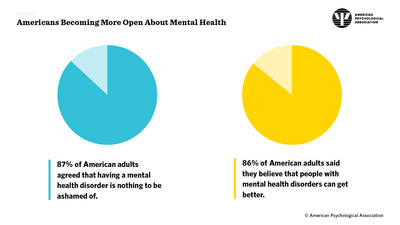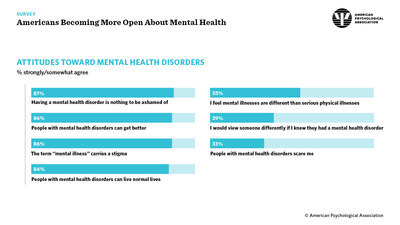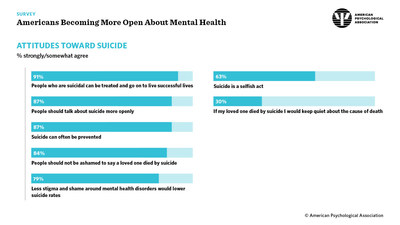American adults mostly harbor positive views about mental health, though some stigma remains.
American adults mostly harbor positive views about mental health, though some stigma remains.
WASHINGTON, May 1, 2019 /PRNewswire/ -- Most Americans harbor positive views about mental health disorders and treatment, according to the results of a survey released today, in recognition of mental health month. The survey was conducted by The Harris Poll on behalf of the American Psychological Association.

A total of 87% of American adults agreed that having a mental health disorder is nothing to be ashamed of, and 86% said they believe that people with mental health disorders can get better, according to the poll.
"The results of this survey are encouraging, and a signal that APA's and others' work over the years to promote mental health care is paying off," said APA CEO Arthur C. Evans Jr., PhD. "They indicate a willingness to be more open about mental illness, as well as a strong belief among older respondents that having a mental disorder is nothing to be ashamed of."
Despite this welcome news, some stigma still persists. A third of respondents (33%) agreed with the statement, "people with mental health disorders scare me," and 39% said they would view someone differently if they knew that person had a mental health disorder.
In the case of mental health disorders, familiarity seemed to breed comfort: 42% percent of people who had never had a mental health diagnosis or known someone who did said that people with mental health disorders scared them. Of people who had been diagnosed with a mental health disorder or knew someone who had, only 27% and 28%, respectively, said the same. Most respondents — 59% — know someone with a mental health disorder. This personal experience is a step toward destigmatizing mental illness, Evans said.
The survey found that 81% percent of people said they would be very or somewhat comfortable being friends with someone with a mental health disorder, and 79% would be very or somewhat comfortable interacting with a person with a mental health disorder. Those numbers dropped, though, for more intimate involvement: The proportion of people comfortable dating someone with a mental health disorder was 51%, and only 35% said they would be comfortable letting someone with a mental health disorder care for a child.
Notably, significant minorities of Americans do not consider the most common mental health disorders to be disorders. A third (33%) said they did not consider anxiety to be a mental illness, and 22% said the same about depression.
The survey also delved into attitudes about suicide. Large majorities of Americans agree that people who are suicidal can be treated and go on to live successful lives (91%) and that suicide can often be prevented (87%). Most also supported openness around suicide, with 87% agreeing that people should talk about suicide more openly, and 84% agreeing that people should not be ashamed to say a loved one died by suicide. Nearly 4 out of 5 (79%) agreed that less stigma and shame around mental health disorders would lower suicide rates.
However, 30% of people said that they would keep quiet about the cause of death if their own loved one died by suicide, and 63% agreed with the notion that suicide is a selfish act.
Young adults between 18 to 34 reported the poorest mental health of those surveyed, as well as the most shame around mental health disorders. Twenty-seven percent of this age group reported poor or fair mental health, compared with 20% of 35 to 64-year-olds and 4% of those 65 and older. While 92% of those 65 and older and 89% of those between 35 and 64 agreed that having a mental health disorder was not something to be ashamed of, only 78% of the youngest adults said the same. Young adults were also more likely than older age groups to believe that most mental health disorders do not require treatment (35% of 18 to 34-year-olds, 17% of 35 to 64-year-olds and 9% of those 65 and older), to say that they would keep quiet about the cause of death if a loved one died by suicide (40% of 18 to 34-year-olds, 30% 35 to 64-year-olds, 18% of those 65 and older), and to disagree that people with mental health disorders can live normal lives (23%, 14%, and 10%, respectively).
"More young adults reported feeling shame and stigma surrounding mental health issues than their older peers," Evans said. "This points to the need for psychology to continue to educate the public so that more people understand that there is no shame associated with being mentally ill."
The survey of 1,006 U.S. adults was conducted by The Harris Poll between Nov. 20-29, 2018. Respondents took a 15-minute online survey about their attitudes toward mental health disorders and mental health treatment. The results were weighted by education, age, gender, race, ethnicity, geography, household income, household size and marital status to represent the U.S. population.
The American Psychological Association, in Washington, D.C., is the largest scientific and professional organization representing psychology in the United States. APA's membership includes nearly 118,400 researchers, educators, clinicians, consultants and students. Through its divisions in 54 subfields of psychology and affiliations with 60 state, territorial and Canadian provincial associations, APA works to promote the advancement, communication and application of psychological science and knowledge to benefit society and improve lives.


![]() View original content to download multimedia:http://www.prnewswire.com/news-releases/survey-americans-becoming-more-open-about-mental-health-300841397.html
View original content to download multimedia:http://www.prnewswire.com/news-releases/survey-americans-becoming-more-open-about-mental-health-300841397.html
SOURCE American Psychological Association




